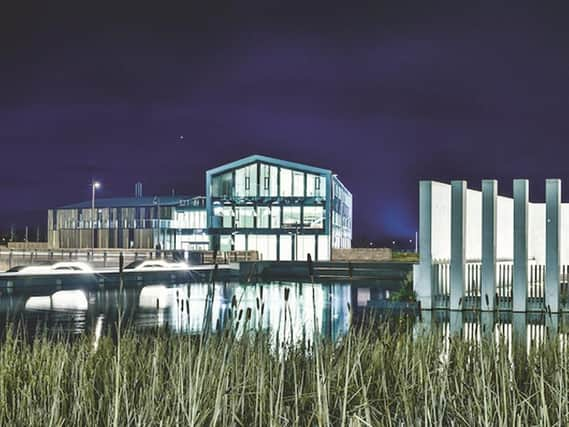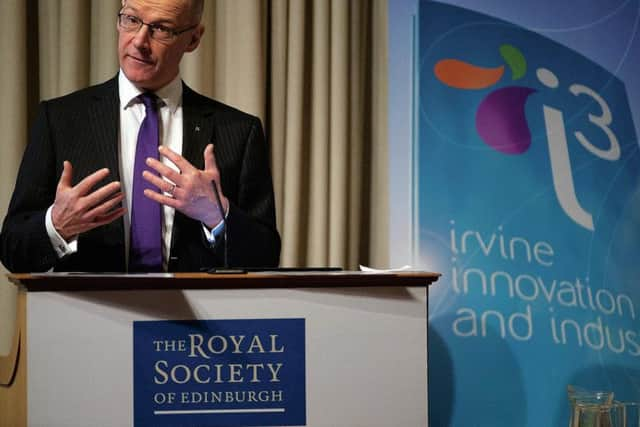Highlands companies offered free Dragon's Den courses to boost their business prospects


Q: Why did you target life sciences particularly with the Pathfinder Accelerator?
The Highlands & Islands region has a strong profile of life sciences and technology businesses, which typically deliver high levels of innovation.
Life Sciences is one of HIE’s growth sectors with great potential across our region, supported by our investments – in the Enterprise Park Forres, Alexander Graham Bell Centre in Elgin, Malin House in Oban and our biggest development, Inverness Campus. It can be a challenging sector, however, for businesses to gain traction, particularly small companies.


Recognising this challenge, we developed a specific set of support activities for early-stage life sciences and technology companies under the umbrella NEXUS.
We launched NEXUS this year to showcase opportunities for start-ups, new investors and international life science businesses that want to establish themselves in the Highlands. NEXUS encompasses shared workspaces, opportunities to work alongside similar businesses and access to research and academic partners, all close to the NHS and Centre for Health Science at the region’s main hospital Raigmore in Inverness. A key strand of our support is the Pathfinder Accelerator.
Q: How did Pathfinder Accelerator fill a gap in the market for business?
We were getting feedback from the business community that courses tended to offer support with specific skills like sales or writing a business plan. There was nothing to take people on a tailored journey to give them the detailed advice they needed in a short time period. Also, we wanted to offer something specifically for Highland businesses so they didn’t have to travel to central Scotland.
Q: How did you go about recruiting?
We took a broad view of health and life sciences, with a focus on making innovation real. We were looking for products and services with a technical or scientific angle that makes scalable innovation possible.
We asked businesses about the opportunity for their service or product: “Would people buy it? What is your ambition?”
Q: When did Pathfinder start and how does it work?
We ran the first full course for eight very varied businesses between May and August 2018 after two pilot programmes. It’s an intensive course and participants come to Inverness Campus once a week for 12 weeks for a full day of workshops and one-to-one sessions with highly experienced business coaches and mentors. It is intensive and demands on the businesses are high – they have to present their findings each week and the course ended with a Dragon’s Den-type presentation.
Q: Is it just for brand-new businesses – and is it just Inverness?
Pathfinder can also be valuable for established businesses who want to launch a new life sciences or tech product or go into a new market.
It’s applicable to businesses at all stages. And we’ll offer Pathfinder in areas like Thurso and Fort William, with more focus on online support.
Q: What did the Pathfinder businesses get out of it?
They gained confidence and found it very useful to be alongside people similar to themselves, facing similar challenges. Having a network of fellow entrepreneurs to draw support from is invaluable. It helped them question what their product is and which market to target.
Anna Renouf, of Orrin Equestrian, said: “Pathfinder is about getting everything to work together, pulling all the separate strands of expertise and knowledge into a solid business model. It’s not just about the product, it’s about what you do with it.”
Q: What does HIE want Pathfinder to achieve?
It’s about creating more functioning, sustainable life sciences and tech businesses to build on our existing strength in the region. We want companies with clarity about who their target customers are, how to appeal to them with a product, how to price it and how to get to market. One person had been on many business courses but said this was the best, due to its personalised, mentored approach and deeper contact.
Q: How have you evaluated the course?
We had a 100 per cent success rate; no-one dropped out, which is very encouraging. All companies progressed significantly and feedback has been very positive. Our initial review suggests we don’t need to make too many changes. We’ll be in touch with all the businesses again in three months, then a year, after the course ends. We’ll keep that going every year for six years to follow progress and connect the different cohorts.
Q: How does Pathfinder fit in to HIE’s wider support for life sciences?
We’ve developed the life sciences cluster at Inverness Campus, mainly focused on medical businesses, and also have a cluster – focused on aquaculture and marine biotechnology – around the European Marine Science Park in Oban, close to the Scottish Association for Marine Science, part of the University of the Highlands and Islands (UHI). Marine opportunities are huge; pharma and biotech businesses can tap into natural resources from our coastline.
The Inverness cluster has the benefit of closeness to the University of the Highlands and Islands, Centre for Health Science and NHS Highland, which is strong in R&D and has an open mindset towards clinical trials. It’s very important for businesses to be able to engage at a local level like this. We also have big life sciences companies like Lifescan and others like Albasoft, which develop clinical software. This co-location really drives collaboration.
Come to the highlands
Life science businesses are coming to Inverness, attracted by purpose-built modern facilities, the collaborative ethos, access to the NHS and level of engagement in the area.
The Scottish Government has highlighted the growing importance of the sector to the region with Life Sciences enterprise area designation and strategic level ministerial involvement in Inverness Campus.
Deputy First Minister John Swinney, chairs the Inverness Campus Partnership Forum and in mid-September visited the site to see the latest developments.
He saw Aurora House, the £2.2 million purpose-built life sciences building, which attracted almost £900,000 funding from the European Regional Development Fund and met representatives from several companies including CorporateHealth International, 4c Engineering, Aseptium, OrganLike and Aqua Pharma.
Swinney also saw progress with £4.5m Solasta House, which is under development in response to a healthy pipeline of enquiries for accommodation for technology and life sciences businesses.
Corporate Health International (CHI), a Danish business which came to Inverness in 2017, specialises in capsule endoscopy, which involves taking pictures of polyps and other signs of disease as a capsule with a tiny camera passes through the body.
“This sort of work can reduce a lot of the pressure on NHS staff by removing time-consuming tasks, and reduce costs by not always needing to carry out a colonoscopy or endoscopy,” says Dr Andrea McColl. “It gives initial indicators which help the NHS staff make a decision on treatment.”
OrganLike, which came to Inverness Campus in March, uses advanced 3D-printing technology to produce hyper-realistic organ models for surgical rehearsal and training. Aseptium is a specialist infection control business, which makes reusable fine surgical instruments.
“Exciting businesses like these are coming to Inverness because of the co-location and very good engagement with the NHS and UHI,” says McColl. “With a local pipeline through Pathfinder and businesses from elsewhere attracted to the region, the life sciences future looks bright.”
The first eight businesses to go through the full Pathfinder Accelerator programme:
Creativity in Care
Karrie Marshall developed a system to aid communication between carers and people living with dementia, using hand puppets. She says: “I found Pathfinder tough and exhilarating. It clarified that I needed to focus on scaling my work. The whole experience has been transformative and inspirational.”
Orrin Equestrian Products
Provider of radical horse saddle redesigns. Founder Anna Renouf says: “I expected to deal with sales directly to keep control of my product, but following profiling exercises, I’m considering licensing as an option due to huge manufacturing set-up costs. We refer to these as ‘Ah-ha’moments – key decisions which really impact on our business.”
External Reality
Provides mobile satellite broadband solutions for use in construction, civil engineering and utilities.
Aurora Sustainability
Bio-refining applications for mushrooms and mushroom mycelium.
Forbovi Limited
Innovative solutions for health improvement in dairy cattle.
Kazbeg
Scientific consulting and technical writing.
Pinnacle Business Solutions
Develops software to support and streamline engineering and construction projects.
Visual Performance ManagementA software for manufacturers developer, which provides clear, real-time information on production processes.
Michael O’Connell, director and co-founder, says: “Pathfinder is very good at challenging assumptions. It reinforced what we’ve done is right, but also helped us understand our customers better and what’s important to them. We also spent time creating pitches and getting group feedback – invaluable.”
Interested in future Pathfinder programmes? See nih.hie.co.uk/pathfinder